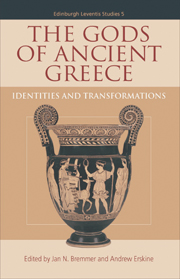Book contents
- Frontmatter
- Contents
- Preface
- List of Illustrations
- Notes on Contributors
- List of Abbreviations
- Introduction: The Greek Gods in the Twentieth Century
- 1 What is a Greek God?
- PART I SYSTEMATIC ASPECTS
- 2 Canonizing the Pantheon: the Dodekatheon in Greek Religion and its Origins
- 3 Gods in Greek Inscriptions: Some Methodological Questions
- 4 Metamorphoses of Gods into Animals and Humans
- 5 Sacrificing to the Gods: Ancient Evidence and Modern Interpretations
- 6 Getting in Contact: Concepts of Human–Divine Encounter in Classical Greek Art
- 7 New Statues for Old Gods
- PART II INDIVIDUAL DIVINITIES AND HEROES
- PART III DIACHRONIC ASPECTS
- PART IV HISTORIOGRAPHY
- Epilogue
- Index
5 - Sacrificing to the Gods: Ancient Evidence and Modern Interpretations
from PART I - SYSTEMATIC ASPECTS
Published online by Cambridge University Press: 05 August 2013
- Frontmatter
- Contents
- Preface
- List of Illustrations
- Notes on Contributors
- List of Abbreviations
- Introduction: The Greek Gods in the Twentieth Century
- 1 What is a Greek God?
- PART I SYSTEMATIC ASPECTS
- 2 Canonizing the Pantheon: the Dodekatheon in Greek Religion and its Origins
- 3 Gods in Greek Inscriptions: Some Methodological Questions
- 4 Metamorphoses of Gods into Animals and Humans
- 5 Sacrificing to the Gods: Ancient Evidence and Modern Interpretations
- 6 Getting in Contact: Concepts of Human–Divine Encounter in Classical Greek Art
- 7 New Statues for Old Gods
- PART II INDIVIDUAL DIVINITIES AND HEROES
- PART III DIACHRONIC ASPECTS
- PART IV HISTORIOGRAPHY
- Epilogue
- Index
Summary
It is a commonplace to say that sacrifice constitutes the central act of the worship of Greek gods and heroes in the Greek cities. One of the likely reasons for this central position is the fact that many other actions, such as processions, dances, prayers, athletic contests and, more generally, festivals and the deposition of votive offerings, were associated with sacrifices or performed in contexts which in some way or other included aspects of sacrificial practice. As Michael Jameson said, in a very concise manner: ‘Ritual activity was crucial for any Greek social entity. Although we emphasize social and political functions, for its members it might almost be said that the raison d'être of the group was the offering of sacrifice to a particular supernatural figure or group of figures.’ It is then a little surprising that some studies on the religion of the Greek polis do not put the sacrificial question at the centre of their considerations.
Another commonplace is to suggest that the sacrificial ritual functions as a mediation between the worshippers and the divine or heroic powers. These are very general statements with which everybody can agree. The difficulties arise when we want to go further and try to explore the significance of this act. Now, the first difficulty comes from the fact that, for many anthropologists, ethnologists, sociologists or specialists in ancient civilizations, the sacrificial act can be explained by one general theory, capable of interpreting all civilizations throughout time.
- Type
- Chapter
- Information
- The Gods of Ancient GreeceIdentities and Transformations, pp. 92 - 105Publisher: Edinburgh University PressPrint publication year: 2010



